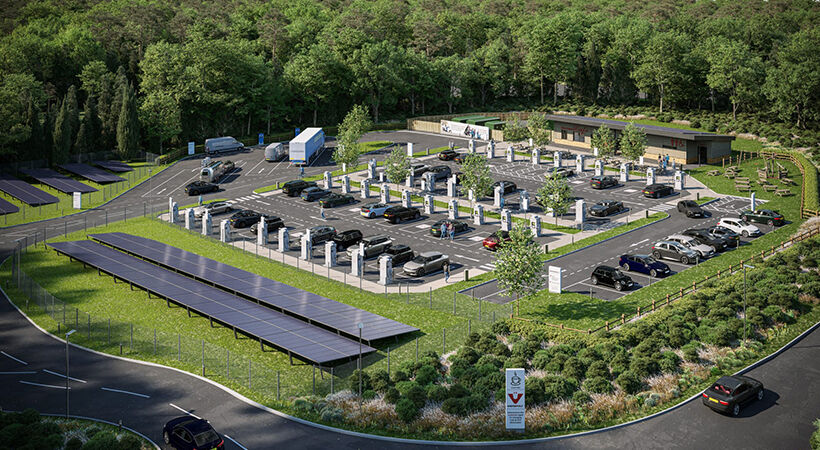Ben Croxford, managing director at Eclipse Power Networks, explains how collaboration between independent power businesses is accelerating delivery and improving outcomes for EV charging operators and their investors.
The UK has embarked on a rapid journey towards net zero, requiring wholesale changes across key parts of the nation’s infrastructure. The decarbonisation of power, heat and transport is critical to hitting our 2050 targets. Of these, transport is the UK’s largest source of emissions, contributing 29.1% of the total in 2023, so targeting transport emissions is fundamental to net zero success.
When it comes to the road network, electric vehicles (EVs) currently offer the most mature and viable technology to deliver significant carbon reductions. Modelling by the Department of Transport suggests that electric cars produce roughly a third of the emissions of conventional vehicles, and have broadly the same per-passenger emissions as trains or buses. Clearly, we need a rapid uptake of electric cars, vans and fleets. And for that, we need a robust and convenient EV charging network.
Constrained by the grid
But despite the demand for EV charging, charge point operators (CPOs) catering for this market are encountering delays with connecting their projects to the UK’s power network. EV charging hubs are by their nature power-intensive, with a mid-sized installation likely to have a peak power demand upwards of three megawatts (MW). Under the previous, ‘first-come, first-connected’ process, some EV and fleet hubs were facing potential waits of several years for a suitably high-capacity connection.
Things are improving within the electricity distribution network, though. NESO, the National Energy System Operator, has implemented a connections reform package, designed to tackle the backlog of important infrastructure projects caught in the queue. This has shifted the connection priority to ‘first-ready, first-needed’, favouring the most viable projects – typically those with secured land rights and Nationally Significant Infrastructure Project (NSIP) planning permission.
It's too early to know the full effect of these reforms. While they should result in quicker connections for EV charging infrastructure, major projects may still face delays due to transmission capacity restraints, and ongoing supply chain and skills shortages in the sector.
Against this backdrop, what can charge point operators, fleet operators and motorway services groups do to accelerate delivery of their project pipeline and secure further investments? The key lies in partnerships with expert independents, working in the distribution and grid connection space.
A flagship EV charging facility
In 2000, the UK’s distribution network was partially deregulated. Among the changes were the provision for new independent distribution network operators (IDNOs) and independent connection providers (ICPs), who would operate alongside the established distribution network operators (DNOs). IDNOs like Eclipse are Ofgem regulated, but able to operate with fewer constraints than DNOs – for example they aren’t confined to a single geographical area, they can take a more innovative approach to connections, and they can offer an asset value contribution, which lowers capex costs for developers or owners.
Working together, ICPs and IDNOs can help EV charge point operators find innovative grid solutions that help streamline their projects, and move them up the connection queue. Eclipse's involvement with InstaVolt’s flagship Winchester superhub provides the perfect example.
The InstaVolt facility at Three Maids Hill comprises 44 ultra-rapid 160kW chargers, an onsite café and a play park. It’s co-located with an 870-panel solar farm and four megawatt hours (4MWh) of battery storage, making this the largest and most advanced EV charging superhub on the UK road network.
The facility and its users gain several benefits from the use of locally generated renewable electricity. Clearly, this minimises the environmental impact of EV driving, and ensures a cost-efficient supply of power. But at the same time, the site’s significant solar output and energy stores can be deployed at peak times to minimise the power taken from the grid. You can see this in the figures: Three Maids Hill has charging facilities totalling 7MW, yet it has ‘only’ a 2MW connection to the grid. Reducing the grid requirements in this way can result in an earlier completion date for connection works, particularly if it avoids the need for reinforcement in the transmission system.
The benefits of partnership
Working with an independent connection provider and IDNO delivered further benefits to the project. Working closely with CX Energy, a leading provider of renewable energy and low carbon solutions, Eclipse was able to verify and approve all aspects of the site’s connection infrastructure. Here, Eclipse’s flexibility meant it could allow a single-substation design that wouldn’t have been acceptable to the local DNO. This innovation lowered InstaVolt’s capital outlay, and reduced the space needed to house electrical equipment onsite.
Eclipse's close partnership with InstaVolt delivers other advantages. As the IDNO for multiple complete and upcoming charging hubs, Eclipse is familiar with the business’ strategic goals, requirements and pain points. Working with other preferred partners, Eclipse can help ensure that projects are suitably specified, while building relationships with the ICPs and other businesses that are crucial to implementing the EV charging infrastructure the country needs.
Keeping pace with connections
As the UK continues to decarbonise transport through electrification, the demand for ultra-rapid charging hubs will continue to grow. The recent House of Commons Committee of Public Accounts report on public charge points for electric vehicles emphasised the Department for Transport's need to “act faster to support ultra-rapid charging at motorway service areas”. If the nation is to stay on track to meet its goal of 300,000 charge points by 2030, the connections process can’t afford to slow down.
Fortunately, as the Three Maids Hill project shows, the right partnerships can make all the difference to getting charging hubs connected on time. As the largest and most advanced ultra-rapid charging hub in the UK, the approach to connecting Three Maids Hill offers a blueprint for EV charging connections across the nation.

